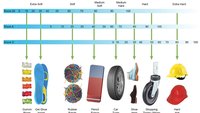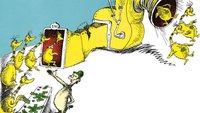mmmmm…. cheezies…
How much do you know about financial independence?
Would I be right in assuming that the first step to financial independence, before all these other things, would be owning your own house?
not owing money
not owing money
well I don't owe any money but I ain't got no house either. My wife's got an apartment in China but we want to hang to that. When we buy a house in Canada she's gonna sell the apartment in China and give all the money to her family.
Would I be right in assuming that the first step to financial independence, before all these other things, would be owning your own house?
there are two points of view on that.
1. Pay off you house and live rent/mortgage free for the rest of life. This takes most people 20-30 years of paying a mortgage @ 3%? 5%? 20%?
2. Rent for life and invest instead and gain 3%? 5%? 7%? on your income.
Which ever gives you better returns is in theory the more effective way, depending on interest rates and investment returns. It's a gamble either way.
and finally…
3. Buy a place in Vancouver and be house poor for the rest of your life.
But yeah, the first step is to have no debt.
owning your own house would be akin to not owing any money, I don't own my house yet but the tennant pays most of the costs which reminds me that buddy owes me some money tonight
Coming into this one a little late:
If anyone is looking for a good book, start with the more philosophical ones first before you get into any of the technical investing books. I found "Your Money or Your Life" to provide a good perspective on putting a value on your time and the power of financial independence. It's usually available at the local library, if I don't have it checked out.
For tracking, I used Microsoft Money since 2004 but moved to You Need A Budget (YNAB) this January. The reporting isn't as robust as Money or Quicken, but it is super convenient and works with all your devices. I prefer to enter and categorize purchases manually at the time of purchase instead of downloading the statement at the end of the month, so having the app on my phone is important. I track everything in there, which makes it super easy at tax time for reporting on rental properties.
You can pull some really interesting trends out of 10 years of financial spending data. For example, I know when my work/life balance is off, or if my wife is off work from film because our monthly restaurant/dining out bill will double or triple. I know exactly how much owning a vehicle costs, which is why I am more and more interested in getting rid of it, buying an electric bike for commuting (25km each way) and working from home more often. For me, it's not the big purchases that affect the budget (because I usually don't buy big expensive things) but all the little ones that add up over time. You really have to buy into the philosophy first and internalize the value of financial independence to have the diligence and willpower needed to avoid all little purchases that the world works really hard to convince us to buy to make our lives "easier" or "more convenient".
Would I be right in assuming that the first step to financial independence, before all these other things, would be owning your own house?
there are two points of view on that.
1. Pay off you house and live rent/mortgage free for the rest of life. This takes most people 20-30 years of paying a mortgage @ 3%? 5%? 20%?
2. Rent for life and invest instead and gain 3%? 5%? 7%? on your income.
Which ever gives you better returns is in theory the more effective way, depending on interest rates and investment returns. It's a gamble either way.
and finally…
3. Buy a place in Vancouver and be house poor for the rest of your life.
But yeah, the first step is to have no debt.
I've run the numbers a couple times and for my wife and I (and our soon to be born daughter) it works out better to rent and invest than own our own home (living in North Van). The calculation is pretty easy to do:
- Find out the total cost of owning a home that is within your means in the place you want to live. Make sure to include your mortgage, all utilities, property taxes, major furnishings and appliances, yard and home maintenance (budget 5% of your mortgage payment per month as a minimum)
- Subtract the cost of your current rent (note this isn't necessarily comparing apples to apples. Most people will buy a home larger then they actually need, but rent something more reasonable).
This is how much money you could be investing every month by not owning your home. Add to that the amount of the down payment and start forecasting the growth of your investment over the next 25 years at your preferred interest rate (5%-7% conservative). Then compare that to the future value of your home (after capital gains tax, real estate fees, etc). Remember, if you own and live in your home, it's usually not paying you any money every month (unless you have a tenant).
A couple interesting things on mortgages and interest:
- At 3%, over a 25 year amortization period - you will end up paying 142% of the value of your home back to the bank.
- At 4%, it's 158%
- At 5%. it's 175%
- At 6%, it's 193%.
Then compare that to the future value of your home (after capital gains tax, real estate fees, etc).
.
All your info sounds pretty good except this part. There is no capital gains on your primary home and considering how much the taxes can be, that's a pretty large error.
Also, it is possible to sell your home without a realtor.
It also seems to assume you are making a small down payment on as much house as they'll let you go into debt for.
What if you're putting 50% down and doing a 5-10 year mortgage on something more affordable?
If anyone is looking for a good book, start with the more philosophical ones first before you get into any of the technical investing books. I found "Your Money or Your Life" to provide a good perspective on putting a value on your time and the power of financial independence. It's usually available at the local library, if I don't have it checked out.
This is solid advice. I read 'the millionaire next door' before I got into budgeting tracking etc, It takes a statistical look at millionaires in the USA (a lot less boring then I make it sound). The lifestyles and consumer habits that they have is significantly more mustachian (and is shown using data) then modern media would lead you to believe.

It also seems to assume you are making a small down payment on as much house as they'll let you go into debt for.
What if you're putting 50% down and doing a 5-10 year mortgage on something more affordable?
IME 50% down will make for a pretty small monthly payment on your mortgage, buy a 250k house with a suite which will cover almost all the bills
Go at least 25% down on a house and you don't need mortgage ins which saves some $
if you don't spend much money you don't need a tracking program cuz you still got all the money
No loans. No mortgages. Buy cash.
It is easy to dodge our responsibilities, but we cannot dodge the consequences of dodging our responsibilities.
- Josiah Stamp
Every time I see an adult on a bicycle, I no longer despair for the future of the human race.
- H.G. Wells
IME 50% down will make for a pretty small monthly payment on your mortgage, buy a 250k house with a suite which will cover almost all the bills
Lots of those around.

Forum jump:







